Note to readers: This post was written in December of 2011. PLEASE do not ask me why I eat ‘this’ or why I don’t eat ‘that’ — as what is shown here does not necessarily reflect what or how I eat today (or more importantly, how you should eat). My diet evolves constantly, due to my constant tweaking and self-experimentation. Over time, I’ll share it here and there, but what I eat is not at all the focus of this blog. I ask that you refrains for pursuing questions about what I eat in the comment section.
Once people start to “get it” with respect to why carbohydrate reduction, or all-out restriction, leads to good things, the inevitable question I’m asked is, “So….what exactly do you eat?” I’m always a bit hesitant to get into this. It’s sort of like asking a pilot, “So…how do you fly this plane?” It’s a great question, but probably the wrong first question.
For many people it’s so overwhelming to contrast what they currently eat – probably a typical American diet of 500-600 daily grams of carbohydrates (200 grams of which are sugar) – with a diet of less than 50 daily grams of carbohydrate, which is what I consume. Remember, what I’m showing you here is what I have been eating for about the last 7 months. For the first 20 months of my nutritional transformation, I was gradually reducing carbohydrate intake from about 600 daily grams to 300 daily grams to 150 daily grams.
It’s really important to understand that carbohydrate reduction is a continuum. There is no “right” amount of carbohydrate to eat. Let me illustrate this with the following “2 by 2” matrix, below (sorry, once a consultant, always a consultant). When asking the question, “How much should I reduce my intake of carbohydrates?” it’s a good idea to start with two broader questions:
- What is my inherent level of insulin resistance?
- What are my goals?
There are technical ways to quantify the answer to the first question, which I will detail in future posts. However, the simple version of determining your inherent amount of insulin resistance is checking how many criteria of metabolic syndrome are present. In other words, are you overweight? Is your waist large? Is your blood pressure high? Do you have elevated blood glucose or triglycerides (these are determined from a standard blood test)? Do you have low HDL cholesterol? For the purpose of this question, even responding “yes” to one of these questions means you are predisposed to being insulin resistant. I was a “yes” to 3 of these questions.
Consider this matrix, and let’s use me as an example.
- How predisposed am I to insulin resistance? One look at a picture of me in my non-lean state, coupled with an understanding of my family history, and it’s clear I didn’t hit the genetic lottery with respect to insulin resistance. Hence, I am towards the right of graph.
- What am I optimizing for? Some folks want to lose 15 pounds. Others want to have fewer swings in daily energy level, or stop taking their blood pressure medicine. In my case, I want to maximize as many variables as possible: I want to be as lean as I can; I want to cure my insulin resistance; I want to be sure I never have a single symptom of metabolic syndrome; I want to do everything I can to avoid cancer and Alzheimer’s disease; I want to be metabolically flexible. Hence, I am towards the top of the graph.
As you can see, based on my poor genes and lofty goals, I find myself in the upper right square, which means I need to adopt the greatest amount of carbohydrate restriction. My wife, in contrast, has good genes, coupled with high goals, placing her in the upper left box. As a result of this combination, she does not need to restrict carbs as much as I do. If her goals were even more modest, she could get away with very little reduction in carbohydrates – probably just reducing sugar without much reduction in starch.
Below is a picture of a few of the foods you’ll typically find in my refrigerator. Note that on average I consume about 4,000 to 4,500 calories per day. I get this from approximately 400-425 grams of fat, 120-140 grams of protein, and 30-50 grams of carbs. In addition, there are a number of supplements I consume daily, which I describe in the table below. In future blog posts I will go into greater detail as to why I consume each of these supplements, but for now I’ll give a very quick explanation.
Finally, note that under no circumstance do I ever count calories (for the sake of limiting them). When I was first transitioning into ketosis I did need to count how much carbohydrate and protein I was consuming – anything over about 50 grams of carbs and 150 grams of protein makes it difficult to generate sufficient ketones – but I do not ever count calories for the sake of restricting them. I eat when I’m hungry. I don’t eat when I’m not hungry.
Regular supplements I consume every day
*I will be writing a great deal about the role of omega-6 and omega-3 fatty acids in our diet in subsequent posts. However, if you want a quick (albeit high-level and not overly nuanced) overview of the topic, take a look at what Dr. Andrew Weil and Livestrong have to say about it.
One last point on supplements – I do not take a multivitamin at this time, but I am looking into it a bit more closely. My concern is that 1) they may not be necessary when you remove glucose from your diet (I’ll write about why in the future), and 2) they may actually do direct harm, as a result of contaminants.
Ok, at long last, here is a list of what I ate over the past 5 days (excluding water, still and sparkling, which I consume about a gallon of each day)
Wednesday
Breakfast: “Fat shake” (In a blender: 8 oz heavy whipping cream, 8 oz sugar-free almond milk; 25 gm sugar-free hydrolyzed whey protein, 2-3 frozen strawberries)
Lunch: About 4 or 5 oz of assorted cheese (Gouda, Swiss, Manchego), 2 or 3 oz olives, about 4 oz of particularly fat salami and pepperoni
Late afternoon: About 2 oz of mixed nuts (almonds, walnuts, peanuts), large latte (latte made with heavy fat cream instead of milk) at Peet’s
Dinner: Garden salad with olive oil (lots of extra oil) and balsamic vinegar dressing, about 6 oz grilled salmon with a lot of butter and lemon juice
Thursday
Breakfast: Scrambled eggs (6 yolks, 3 whites**, with added heavy fat cream) cooked in coconut oil, 3 or 4 sausage patties (be sure to look for brands not cured in sugar).
Coffee with homemade whip cream (heavy fat cream hand whipped)
Lunch: Half chicken (thigh, breast, wings) with lots of skin; about 2 oz of Gouda and aged-cheddar
Dinner: Wedge blue cheese salad with bacon; 12 oz prime rib with lots of butter; 5 or 6 pieces of asparagus coated in butter
Coffee with half and half cream, 2 cups (the restaurant did not have heavy cream, so I had to settle for half-and-half)
**The reason I typically minimize egg whites, at least when making my own eggs, is to ensure I keep protein intake under about 125 grams per day. Ketosis is pretty easy to attain if one is eating, say, 2500 calories per day. However, given my caloric demands – and the requirement that I keep protein intake limited – I really need to go out of my way to ensure I’m not eating too much protein. I will be writing about this in much greater detail in a future post.
Friday
Breakfast: Whole fat latte at Starbucks (made same as above), scrambled eggs (about 4 eggs), bacon (high fat pieces), slice of Swiss and slice of cheddar (since I was eating in the airport, the scrambled eggs were made “normally,” not with the additional fat I use when making my own)
Lunch: About 4 oz of especially fat salami and pepperoni, about 2 oz Parmesan cheese
Dinner: Ground beef sautéed with heavy cream, onions, broccoli, and melted cheese
2 large cups of decaf coffee with homemade whip cream (heavy cream whipped with a touch of xylitol)
Saturday
Breakfast: Scrambled eggs (6 yolks, 3 whites, with added heavy fat cream) cooked in coconut oil, 3 or 4 pieces of especially fat bacon (not cured in sugar), about 3 oz of cream cheese
2 cups of coffee with heavy cream
Lunch: Tomatoes with basil and mozzarella and balsamic vinegar and olive oil, about 2 oz raspberries with homemade whip cream
Dinner: Leftover ground beef sautéed from previous night, salad with homemade cream dressing (whole fat Greek yogurt, olive oil, basil, blue cheese, garlic)
1 cup of decaf coffee with homemade whip cream
Sunday
Breakfast: Omelet (6 yolks, 3 whites, coconut milk, sautéed onions) cooked in coconut oil, 4 or 5 pieces of the fattest bacon I can find
2 cups of coffee with heavy cream
Lunch: Plate of assorted cheeses (aged Gouda, Swiss loaf, aged Parmesan – about 3 oz), about 2 oz salami, about 1 oz olives
Dinner: Cream of mushroom bacon soup (heavy cream, chicken broth, shredded Parmesan cheese, mushrooms, chopped bacon, garlic, butter, chopped papers, various spices), leg of lamb (baked in sauce made of red wine, balsamic vinegar, diced tomatoes, garlic, and a lot of spices)
2 cups decaf coffee with homemade whip cream (as above)
So there you have it — 5 days in the eating life of Peter Attia. This may look a bit strange, relative to what you may be eating now, but remember, I’m at the far end of the spectrum – i.e., nutritional ketosis. You may just be starting your own journey of reducing carbohydrates, but I hope this gives you an idea of what I eat. In particular, what probably stands out is:
- I go to great lengths to avoid sugar which, unfortunately, shows up in virtually every highly processed food.
- I eat zero starch (e.g., bread, cereal, rice, crackers, pasta).
- I consume only modest amounts of fruit (one serving per day, at most, and only in the form of berries, which contain the least amount of fructose).
- I eat vegetables, but primarily because they are a great way to get more fat (e.g., high-fat salad dressings, butter), not because I “need” them.
- I go out of my way to eat as much fat as possible, especially monounsaturated and saturated fat (the only fat I avoid is omega-6 polyunsaturated fat).
- I have a few “go to” meals that I eat several times per week. I do this because I really like them and it’s quick and easy make them. Yours need not be the same!
Photo by Glen Carrie on Unsplash

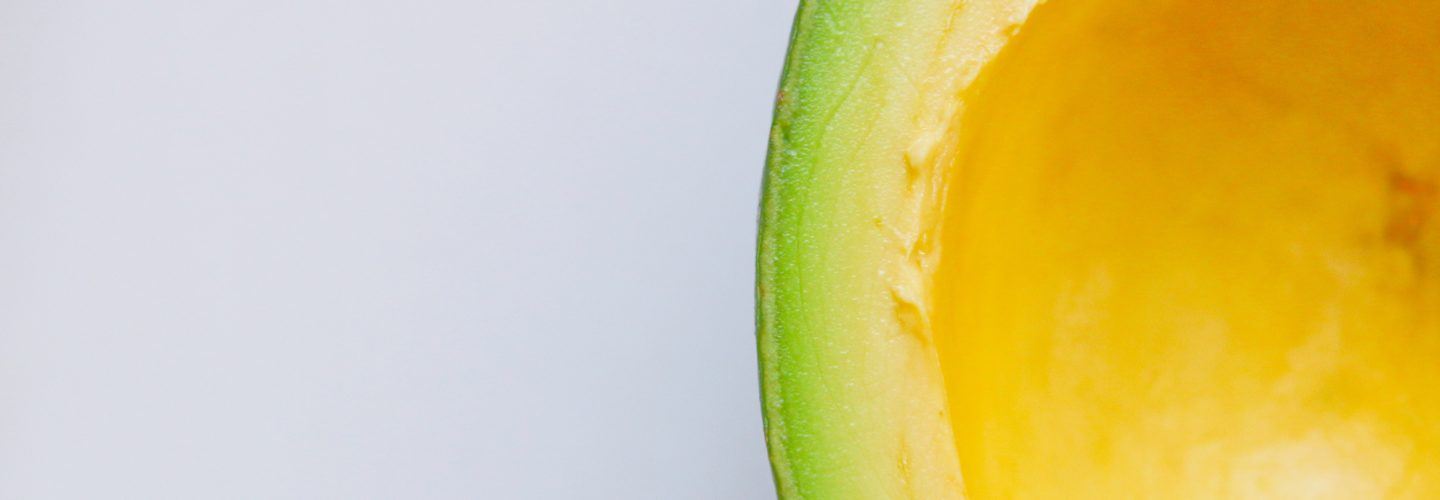
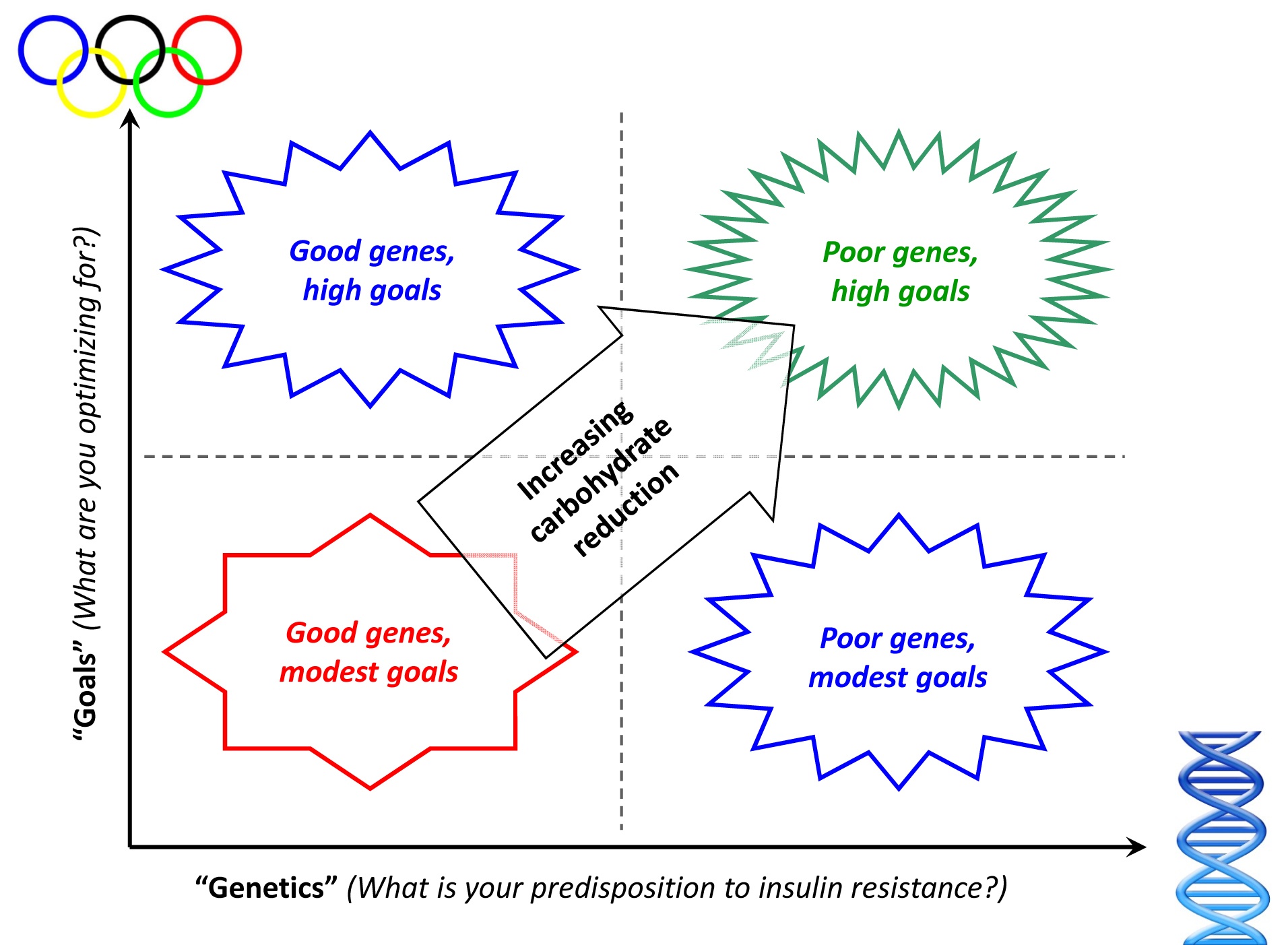

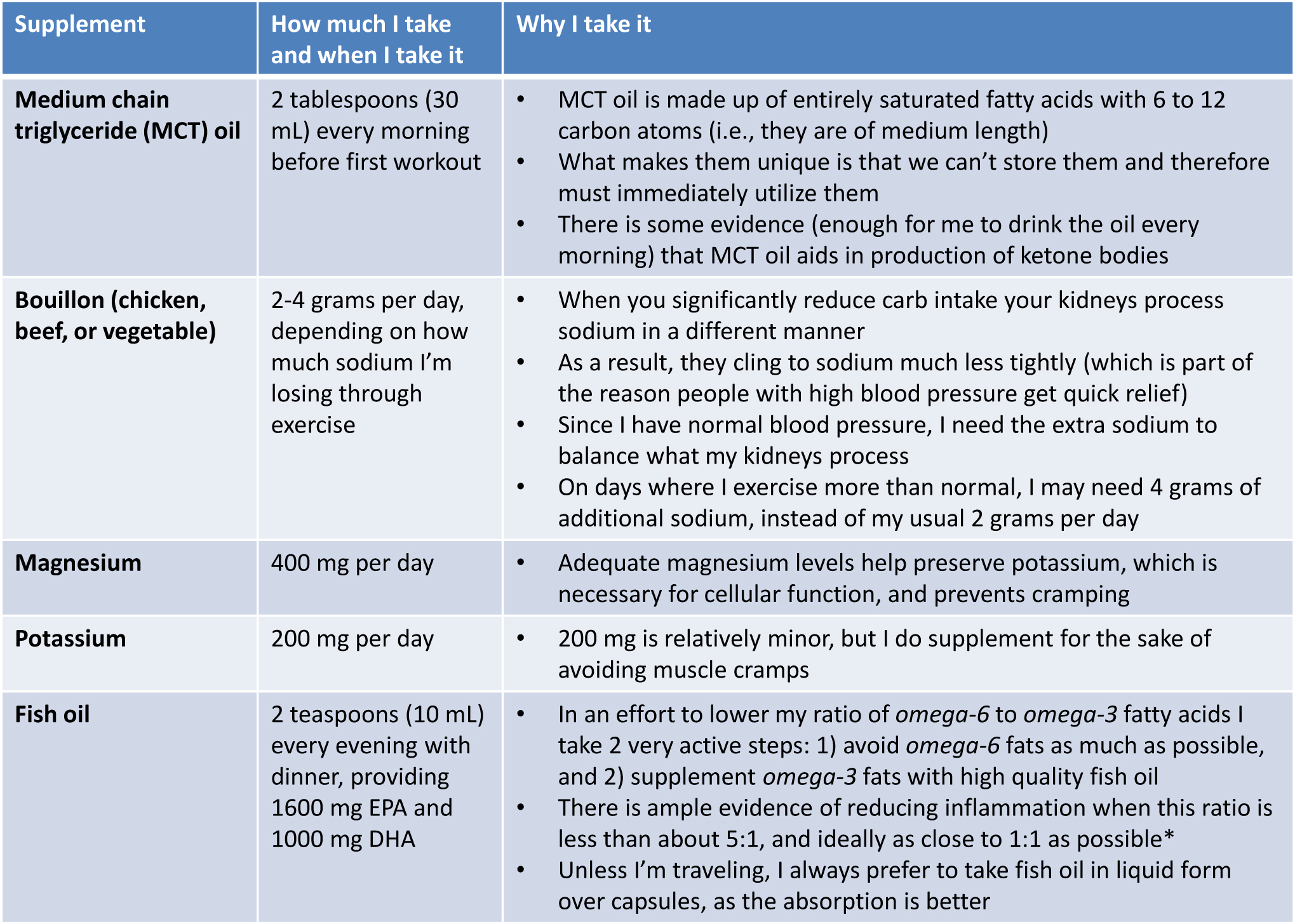

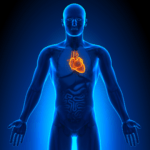
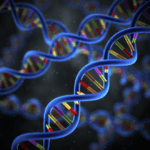
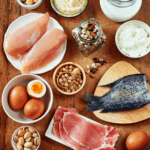
Hello Peter! this is fantastic! Your diet is almost no different than most celebrities and supermodels. I can say minus the heavy creme women who eat like this look like goddesses!
I put a teaspoon of coconut oil in my green tea and decaf coffee. Also make almond milk from scratch and mix w/chia seeds for a nice fatty but light breakfast. Top with strawberries. You consume ALOT of dairy-usually this can cause gut distress and added inflammation. For someone like me it’s a little more challenging following this diet with no dairy, except goat (cheese/yogurt)- which makes for a flat tummy. Amazing work you are doing!! SUPERHERO!
Too bad I’m neither a celebrity nor a supermodel, huh?
Peter,
Sure it’s too bad you’re not a celebrity or supermodel but I would agree with Amy that you are a SUPERHERO!
…by the way Peter, didn’t the chart above (genetics versus goals) used to also display an arrow indicationg the amount of possible carb-restriction as a function of genetics versus goals? If yes, was there a reason you changed the chart?
I though I saw that once and am merely curious.
Hi Peter,
I thought I had posted this the other day, but must have not hit submit…Have you measured pre and post Ketosis Testosterone levels?
Yes, previously responded.
Thanks Dr. Attai for putting together this website. Im actually a lacto-ovo vegetarian- i dont eat eggs or fish, or meat, but do eat cheese and drink milk. Im wondering, how do you tailor this diet to vegetarians like me? instead of eating eggs and bacon- is there a substitute? possibly tofu? And vegetarians do rely on carbs more or less than protein as part of their diet. I do eat lentils as well- and so can that suffice for my protein intake? Im wondering because most of my fat accumulates in two places- my belly and my face. Ive had 3 abdominal surgeries and was wondering if that predisposes to fat accumulation? Anyways, the main question was regarding how a vegetarian like me can adapt a diet similar to yours?
Thank You for your time!
Hi there, great site – why do you think fructose is not a good choice ? I use a nutritional supplement in meal replacement form twice a day and it contains fructose but have kept my weight the same for 10 years now. Waist measurement of 30inches. Would love to know if I lost all other forms of other sugars in carbs etc but continued using these supplements what do you think my chances of losing body fat would be ? appreciate your response.
It’s all about quantity. See recent post on sugar.
Hello, Dr. Attia! I found your blog couple of months ago and just love it for the quantity and quality of the information. I see that you’re big coffee drinker just like me, but I have this little problem – I like my coffee extra sweet and I’m used to sweeten it with honey. The problem is that I drink 4-5 cups a day which makes it easier to go way over 50 gr. carbs a day just by adding honey. I’ve tried stevia and aspartam-based sweeteners and they suck, when it comes to taste. Can you, please, share you experience with sweeteners? Thank you and keep up the good work, much appreciated!
I wrote a post on this.
i am curious, someone mentioned to me how you did eat so much calories and lost weight.. My question is I wondering I tried one experiment back a year ago not super high but I use to eat like very lean mainly eggs and bison ground and not much high in fat then i changed to adding like probably 1/3 container whipped butter and stick butter and bone marrow and meat with skin on it and broth fatty ..and was up from 1300 to 2800-3000 calories mainly from all the added fat.. but my protein was in 180 or less but I do wonder I was very lean too.. then when I stopped I gained after jumping to lower calories like 1800 or 1500 or even 1200 and just struggled and gained weight .. my question is if i jump right back to what I use to do or like even just stop counting calories go low carb and extremely load up on the fat and such will my weight benefit in losing or is that one time thing.. Mainly many people are like telling me that I need to eat less and fell into that mindset even for low carb to lose and when i read their menu like under 1000 calories or 1200 and such I wouldn’t be able to do that..
So what would you suggest. 🙂
thankyou
Keep in mind, I exercise quite a bit.
Love seeing the examples of your diet. I’m insulin dependent diabetic, and I just can not seem to lose weight. I’ve spent a whole lot of time being very hungry and very discouraged over the years, and finally decided to ditch the carbs completely recently. Though I’ve restricted carbs in the past, I really didn’t have a lot of success because I was still trying to stay low-fat. I just figured it didn’t work for me. In my most recent effort, despite keeping my total carbs at less than 35g per day (incidental and from veggies and nuts), I’m just not losing weight. My insulin requirements have, however, decreased dramatically and my blood sugars are running an average of around 150 on just basal insulin. Your website is like a goldmine. I’m absolutely the walking incarnation of ‘sick and tired of being sick and tired.’ Thanks for your hard work, and the clarity of the information you’ve provided. I look forward to educating myself, and hopefully finding a way of eating that will finally work for me.
Hi from Sydney, Australia!
I have a question for you about how you changed your diet. After reducing sugars and carbs you went the next step and increased fat and dropped protein. Why reduce the protein?
Quick rundown: I gained a lot of weight with my first baby and did not lose it after birth. Now, I am 4 months pregnant with the 2nd, and I would love to know if you have any information regarding this type of diet during pregnancy in order to use the unwanted fat for fetus nourishment?
Thank you for taking the time to consider my question!
Melissa
ok I took a plunge lol .. Right into the plan that did help me last year, being female figure I wouldn’t benefit as well as if a guy, but honestly if it worked last year then why not now.. So I started upping my calories with alot of fat(unlimited) yesterday I made the goal of 80% fat for the day finally lol never knew how hard when trying to work with bit of leaner turkey meat lol.. next time will try to use beef lol … so I’ve added heavy cream, 12+ tblspoons butter, Avocado, and been normally eating eggs cheese and ground turkey not the leanest type and turkey bacon cause crisps better.. but might give pork regular type for more fat a try.. and use the oil to soak into the food lol as well… so every meal i’ve eating has at least 3tblspoons butter and avacado and any other fat lol I feel lol 🙂
the results== after not losing I’m finally thinner like last year when i did unlimited fats and mini snacking of protein .. I just am super happy my clothes are feeling looser, and my face so much thinner.. I thought it be impossible to have done since I am very thin already so to be able to not gain and to drop weight on a leaner person then obese with unlimited calories 2500+ .. IS JUST TERRIFIC.
after this change my stress level went down, worries are gone.. Just smile every day and feel great to see my self in the mirror.. Like now I know my body is happy, its getting enough food and isn’t fearing of never having enough so it can let loose of the fat stored..
🙂 sorry for going on, I just wanted to share that you’re right
eating calories super high isn’t the cause of weight gain cause its the opposite for me.. I eat under 2000 and gain ..go figure lol
Hey Peter,
So I am coming up on 5 weeks of strict ketogenic diet. I did experience for a week, maybe even slightly longer, what has been labeled on some online ketogenic blogs as a “keto flu” where I felt fatigued and tired. I assume this was occurring due to the fact that I was probably not getting enough electrolytes daily. I recently began supplementing Mg, Na, and K with Gatorlytes and have begun to feel more energized, although I was just wondering if there was an optimal time frame in which to supplement my electrolytes, like before a meal or workout?
Best Regards,
Anthony
Do you know of anyone in the Houston, TX area that could assist with monitoring/assisting individuals on a keto diet?
Not that I can think of.
Peter,
Thank you so much for sharing your knowledge and experiences with us. I have spent the last 3 years trying numerous strategies for managing my weight with minimal success. I believe I’ve been in ketosis for about the last 4 weeks and not only have I been able to control my weight, I’ve also had the best mental acuity and energy levels that I’ve probably had in my entire life – Even my memory has gotten better! I really want to express my sincere appreciation for you to take the risk of going against the grain by sharing your experiences with ketosis.
In my few weeks of experience with the diet, I have had an additional and somewhat unexpected “side-effect.” While I have neither the equipment nor expertise necessary to measure sperm count, it has become readily apparent that the quantity of my ejaculate has increased tremendously since I’ve entered ketosis. I’m not going to go into the details of my rudimentary measurement methodology, and from my perspective this is just a neutral “side-effect,” but I was hoping to get your thoughts.
Hi Peter:
A co-worker just turned me on to your site. Great stuff. I’m starting to completely rethink my dependence on carbs as a fuel source for my marathoning. But I have one concern. How do you ensure you get enough dietary fiber with such a low-carb diet?
Plenty. I usually eat 2 salads per day.
Hi Peter,
I have quick question. I am thinking of changing my eating habits to reflect some of the changes that you endorse. My only concern is that I am suspected of having a “non-dizzy” version of Meniere’s, call Cochlear Hydrops. It is very well contained by minimizing sodium (less than 1.5 grams per day). This is what I have been following. Ironically, w.r.t. carbs, bread seems to be as major a culprit in being a carb as it does in carrying salt.
Does this cause a problem with Ketosis or following low-carb at all?
Many thanks.
Mitch
I don’t know, Mitch. Sorry.
Love this website, loving the keto diet. Here’s a question I bet you’ve never been asked. What do you suggest as a list of foods and drinks to ingest during a 24 hour long run? I’ve been LCHF for about five weeks and this will be my first race without carbs. I have been using macadamia nuts in training, but will want a greater variety during my race. Thank you.
Discussed elsewhere.
Hi Dr. Attia,
Was on Metformin for a few months and it really helped me. Came off of it b/c of some really bad side effects and within 6 weeks was up 10 pounds and now PCOS back in full bloom. Trying to go Ketogeneic and started Insanity about 5 1/2 weeks ago and an herbal program called Insulite to try to help the IR. I’ve been working out to Insanity 5 days a week for the last 5 1/2 weeks. I’ve been Low carb for years but now I’m trying to eat less than 30-40 grams of net carbs per day. trying to keep protein to 80-90g and fat over 100g but in all honesty I don’t log it every day. Now I have lost inches but the scale hasn’t budged and I really can’t tell if I’m in ketosis or not. In the past when I was in Ketosis the weight FLEW off of me and I’m so IR right now I just feel like I can’t get there. I have had a couple of days of flu like symptoms where I swear I was in, but the next day (after calorie loading) I seem better. I’m so confused – should I be watching my calories like a hawk? How will I know I’m in ketosis? Should I get the sticks? And at this point working out as intensely as I am shouldn’t I be dropping weight? IDK Very frustrated and any advice would be helpful. Oh – I’m 5’2″ and 161 – before I stopped the Met i was 153 – But again I have lost some inches from the working out. Eating like this and being this IR how long should it take me to get into Ketosis? If you can direct me somewhere else on your blog I’d appreciate it. Jessica
Very hard to say, which I know is not a satisfying answer. Anywhere from a few days to a few weeks (to never, if doing so incorrectly).
Peter,
Thanks so much for this very informative blog. I started lchf six weeks ago and I’ve never felt better. I’ve lost almost 20 pounds so far and eating 2000 to 2200 kcal doesn’t seem like dieting. Such a difference when feeling full and satisfied from the fats and protein. I notice I do best when fat is at least 68% preferably 70%+ and I need to consciously watch the protein, it is so easy for it to creep up to 30%+ but if I weigh and measure my food I can get it to 20-24%, about 100 – 120 grams, and that seems to be about right for me. I started at 222 pounds and today I’m 203. I’m due for a physical in two weeks so I’m waiting to see if my fasting glucose is back below 100 (103 last year) I’ve always had marginally high cholesterol with a low hdl but last year the triglycerides were elevatedtoo, something I hadn’t had before so I’m hoping those might improve too. I do have a plan though, If the numbers are still high or have gotten even higher I think I’ll ask for a retest in six months with the full panel to get the particle size before considering statins.
Hi Peter,
So glad to come across your blog. I DO have one question. I see you dont consume much veggies through out the day. I usually include in every meal. Did you find they werent so beneficial after all? Im struggling still to lose weight even low carb. Im on some meds which I know will slow down progress. Im on 100mg Zoloft, 30mg Cymbalta, Lovastatin. I struggle with high blood pressure as well. My Dr. suggested a nutritionist. Im so frustrated I want to give it all up and say screw it. Any input? Thanks so much.
Melanie